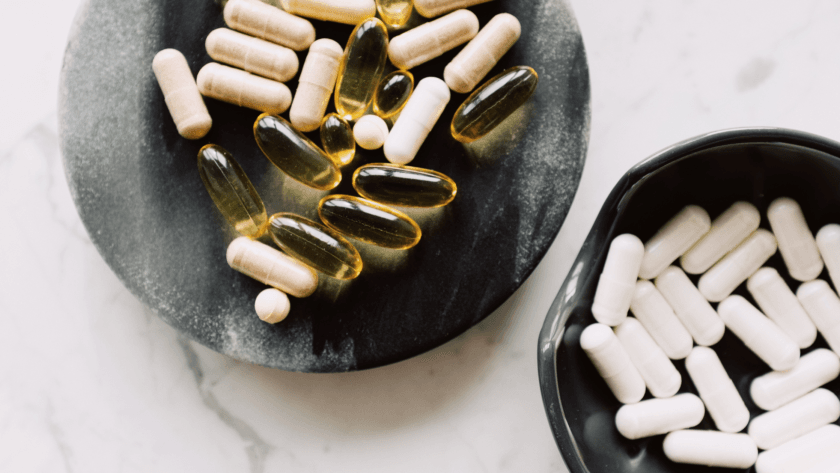Vitamins play a crucial role in every stage of the hair growth cycle. They provide the essential nutrients that hair follicle cells need for healthy development and optimal function. For instance, vitamins facilitate processes like protein synthesis, which is vital for producing hair protein strands. Antioxidant vitamins help protect hair cells from oxidative stress, while B vitamins aid cellular metabolism and growth.
A balanced diet should provide your body with the nutrients required to maintain healthy hair. When vitamin levels drop too low, hair follicles struggle to sustain healthy hair production. Nutrient deficiencies can disrupt these intricate processes, leading to excessive shedding, slow growth, thinning, dullness, changes in texture, and patchy hair loss. Identifying and addressing vitamin deficiencies is crucial for restoring hair health.
Contents
Vitamin Deficiencies and Hair Loss
Extensive scientific research demonstrates clear connections between vitamin deficiencies and hair loss, particularly thinning and excessive shedding. Here are some key findings:
- Studies reveal that individuals with thinning hair and alopecia often have lower levels of vitamins D, B12, and other essential micronutrients compared to those without hair loss issues.
- Clinical trials show that replenishing deficient vitamin levels improves hair density, reduces shedding, and enhances overall hair health.
- Biochemical studies outline the mechanisms by which vitamin deficiencies disrupt hair follicle function, development, and protein production.
In addition to hair changes, vitamin deficiencies can cause symptoms such as fatigue, weight loss, frequent illness, muscle weakness, joint pain, loss of appetite, mouth ulcers, vision issues, and mood changes. These symptoms may provide clues to an underlying deficiency.
If you suspect a deficiency, consulting a healthcare provider for proper diagnosis and treatment is essential.
10 Key Vitamin Deficiencies Linked to Hair Loss
Hair health relies on adequate levels of various vitamins. Below are ten common vitamin deficiencies that can trigger hair loss, along with their symptoms and solutions:
1. Vitamin D
Vitamin D deficiency can cause dry, brittle hair, excessive shedding, and thinning. Low levels have also been linked to premature graying.
Diagnosis: Blood tests measuring vitamin D levels.
Treatment:
- Daily supplementation (2,000-4,000 IU, or as advised by a healthcare provider).
- Increasing sun exposure.
- Consuming vitamin D-rich foods like fatty fish, egg yolks, and fortified dairy.
2. Vitamin A
A deficiency in vitamin A can lead to hair thinning, increased shedding, and prolonged regrowth periods. Dandruff may also occur.
Diagnosis: Blood tests measuring retinol levels.
Treatment:
- Vitamin A supplements (consult a doctor for safe dosages).
- Consuming foods like carrots, sweet potatoes, squash, and dark leafy greens.
3. Vitamin E
Inadequate vitamin E often causes increased shedding, dry and damaged strands, and progressive thinning.
Diagnosis: Blood tests checking alpha-tocopherol levels.
Treatment:
- Vitamin E supplements.
- Eating vitamin E-rich foods like almonds, sunflower seeds, spinach, and avocados.
- Applying oils like olive or rosehip oil to the scalp.
4. Vitamin C
Deficiency in vitamin C can result in:
- Dry, splitting hair.
- Increased shedding.
- Slow regrowth.
- Brittle strands.
Diagnosis: Blood tests measuring ascorbic acid levels.
Treatment:
- Daily vitamin C supplementation.
- Consuming foods like citrus fruits, peppers, broccoli, and strawberries.
5. Folic Acid (Vitamin B9)
Folic acid supports rapid cell division essential for hair follicle production. Deficiency can cause slowed regrowth and increased shedding.
Diagnosis: Blood tests measuring folate levels.
Treatment:
- Folic acid supplements.
- Consuming leafy greens, citrus fruits, beans, and lentils.
6. Biotin (Vitamin B7)
Biotin deficiency can lead to hair thinning and shedding. While biotin supplements may help correct deficiencies, their benefits for hair loss in individuals without deficiency remain debated.
Best sources: Whole grains, eggs, nuts, and seeds.
7. Zinc
Zinc deficiency disrupts cell growth, protein production, and hormone regulation in hair follicles, causing thinning and shedding.
Treatment:
- Consuming zinc-rich foods like oysters and spinach.
- Zinc supplements (consult a healthcare provider).
- Addressing digestive issues that affect zinc absorption.
8. Vitamin B6
Vitamin B6 supports enzymatic reactions crucial for hair health. A deficiency can cause thinning and hair loss.
Treatment:
- Consuming foods like poultry, potatoes, bananas, and nuts.
- Daily supplementation under medical supervision.
9. Iron
Iron deficiency, often leading to telogen effluvium (excessive shedding), results in progressive thinning.
Diagnosis: Blood tests measuring serum ferritin levels.
Treatment:
- Iron supplements.
- Consuming iron-rich foods like red meat, beans, lentils, spinach, and fortified cereals.
10. Essential Fatty Acids
Omega-3 deficiency can contribute to a dry scalp, itchiness, and brittle hair.
Diagnosis: Blood tests measuring omega-3 index levels.
Treatment:
- Omega-3 supplements like fish oil capsules.
- Consuming salmon, walnuts, and flaxseeds.
Holistic Approaches to Address Hair Loss
While medical treatments like supplements are vital for addressing deficiencies, holistic strategies can complement them. Here are some approaches:
Dietary Changes
Focus on a diet rich in vitamins and nutrients:
- Fruits and vegetables for antioxidants and vitamins.
- Lean proteins for keratin production.
- Healthy fats for scalp nourishment.
- Whole grains and legumes for B vitamins.
Lifestyle Adjustments
Adopting healthy habits can enhance hair health:
- Manage stress through yoga, meditation, or journaling.
- Quit smoking to reduce follicle damage.
- Scalp massage to improve circulation.
- Protect hair from sun damage with hats and gentle styling.
Natural Supplements
Incorporate natural supplements like:
- Biotin gummies.
- Omega-3 capsules.
- Topical oils (rosemary, peppermint, lavender).
These supplements, along with dietary and lifestyle changes, can help restore hair vitality.
Conclusion
Hair loss caused by vitamin deficiencies can be distressing, but the good news is that it’s often reversible. Identifying and addressing deficiencies through diet, supplementation, and lifestyle adjustments can restore your hair’s health and vitality. If you’re experiencing hair loss, consult a healthcare provider to determine the best course of action tailored to your needs. With the right approach, you can nourish your hair back to its former glory.



